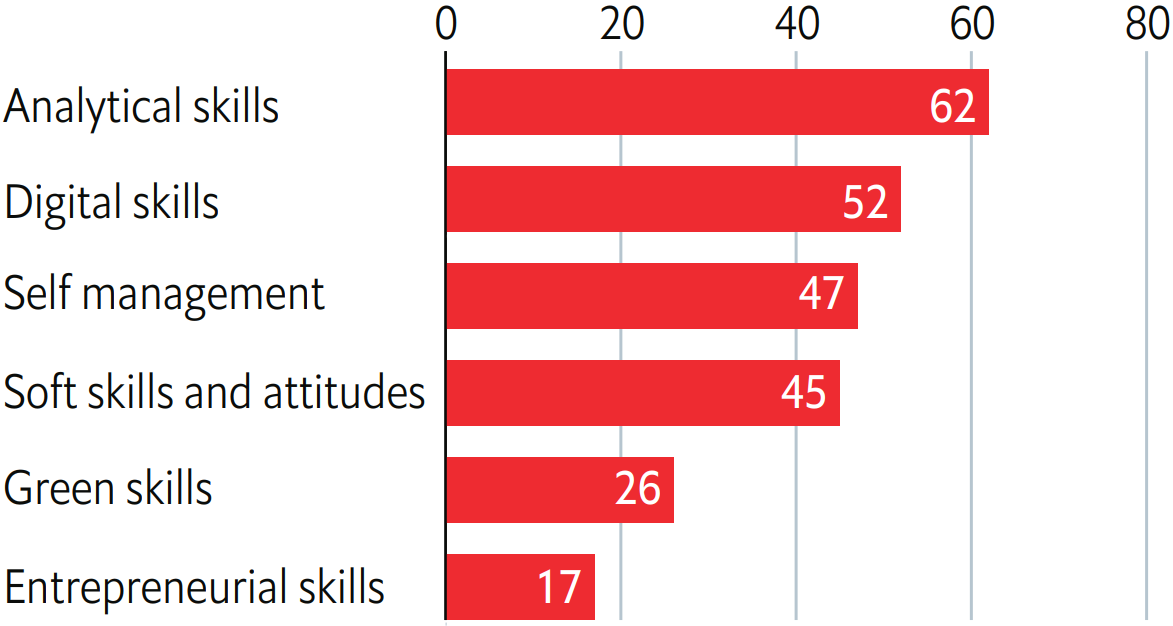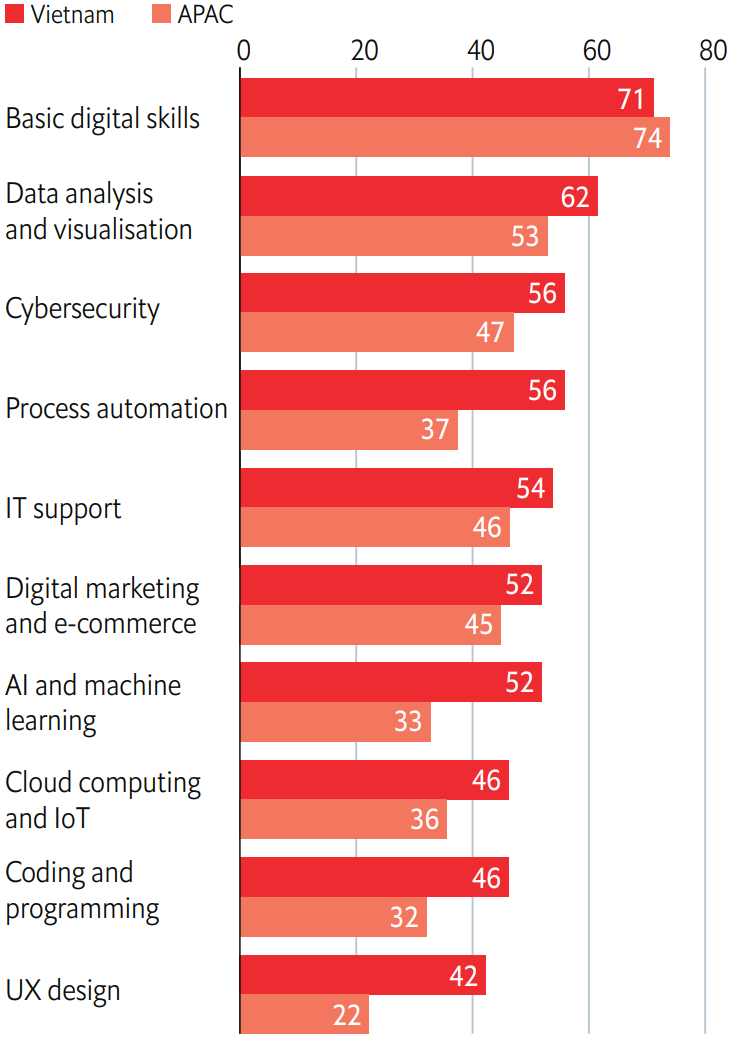The survey respondents were drawn from across 14 markets in the region, out of which 11.8% were Gen Z (born in 1997-2012), 63.2% were Millennials (1981-96) and 25% were Gen X (1965-80). They all worked in a diverse mix of industries.
The research shows that, across the region, common understanding is lacking between employers and employees about future skills and the best ways to develop them. In some instances, there is also an expectation mismatch between what employers want and what employees see as being important. Understanding these gaps will be instrumental in creating a workforce that is prepared for the economy of the future.
This article—one in a series of 13 market reports—examines these issues in Vietnam. This series complements a research paper that looks at the reskilling and upskilling imperative across APAC.
Key findings
- Analytical skills (62%) and digital skills (52%) are the top two skills prioritised by employees in Vietnam. Within digital skills, both basic and advanced skills are highly regarded. Certain advanced capabilities such as UX design, artificial intelligence (AI) and machine learning (ML), cloud computing and IoT, and cybersecurity are valued higher than the APAC average.
- Improved salary and bargaining power are the main motivations to upskill for nearly 80% of employees. However, employees face diverse barriers. Seventy percent agree that they generally have a poor understanding of what skills are in demand. Other barriers in acquiring new digital skills include a lack of time for learning new courses (34%), the high cost of courses (29%) and poor internet access to join online courses (28%).
- Employees in the country primarily consider employers responsible for upskilling support. These areas include sharing information on skills required (60%), providing financial incentives for skilling and notable recognition such as certificates (58% each). Meanwhile, 43% of employees say the government could lead in providing access to diversified skilling programmes.
- Skills-based hiring is becoming popular in Vietnam; 80% of employees agree that employers are shifting the focus of hiring from full-time degrees to skills-based qualifications.
After being cited as an economic success story in the past decade, emerging Asian economies like Vietnam are experiencing an economic downturn as a result of multiple headwinds including Russia's invasion of Ukraine and sluggish economic growth globally. The impact of weak global demand and resulting domestic slowdown1 has particularly impacted manufacturing firms and export hubs due to the country’s heavy reliance on these sectors for economic growth.2
Nonetheless, Vietnam’s labour market will have multiple factors working in its favour in the coming years. Having a relatively younger workforce compared with its Asian counterparts such as Japan, South Korea and China provides Vietnam with a demographic advantage. Moreover, being a member of over a dozen free-trade agreements gives the country easier access to scores of national markets globally. The country recently upgraded its strategic partnership with the US in sustainability, innovation and skills development, which is expected to create new jobs and drive upskilling.3
In the coming decade, Vietnam is aiming to transition into a high-income nation by prioritising its digital economy and becoming a fully digital society by 20304 through greater technological integration in online services, digital education and e-payments, among other areas.5 A key factor to achieve these ambitious goals will be identifying and closing the skills gaps by equipping the workforce with the right capabilities across Vietnam’s economy.
Vietnamese employees highly value analytical skills and digital skills
Analytical skills, encompassing capabilities such as project management, critical thinking and problem solving, are considered the most important by Vietnamese employees (62%), higher than the regional average (49%). Professor Hoàng Hữu Hạnh (Hoang Huu Hanh), director of the Center of International Education of Posts and Telecommunications Institute of Technology (PTIT), underscores the importance of analytical skills for programmers. He says, “Problem solving and algorithmic thinking are becoming even more important because AI can help to code but programmers need the analytical skills such as how to approach an issue, analyse a problem and design what to code.”
Figure 1: Analytical and digital skills are considered the most important by the Vietnamese workforce
Which skill categories do you think are the most important for the workforce in your sector to acquire today? (% of respondents)

Source: Economist Impact, 2023
Digital skills are valued by more than half (52%) of Vietnamese employees. Within this broad category, they consider certain advanced capabilities such as UX design, AI and ML, cloud computing and IoT, and cybersecurity as must-haves, higher than the APAC average (Figure 2). Despite their growing importance, there are wide shortages in advanced skills such as AI. While the Vietnamese government is investing heavily in AI and digital technologies, the country faces skills shortages, as it has just 300 AI experts in the workforce, according to the World Intellectual Property Organisation.6 To increase such specialists, Mr Hanh identifies a critical role for training providers who can redesign the curriculum to match it with industry demand. “The training providers need to focus on creating content that is interactive, focused and can be learnt in a short duration of time,” he adds.
Vietnamese businesses are actively adopting technologies such as cloud with a majority indicating an interest in designing a cloud migration strategy in a 2022 survey.7 However, fast digitalisation and adoption of new technologies have exposed the country to rising cybersecurity risks. Vietnam suffered more than 15,000 cyber-attacks in 2022, the third highest in South-east Asia, after Indonesia and Thailand.8 As the number and severity of these attacks rises, organisations would need solid cybersecurity capabilities. However, there exists a substantial gap to fill the current demand for cybersecurity specialists, as 76% of organisations reported lacking staff to protect their organisations against cyber threats, according to the Vietnam Information Security Association.9
Figure 2: Must-have advanced digital skills for employees in Vietnam vs APAC
Which specific types of advanced digital skills are a must have for the workforce in your sector today? (% of respondents who selected “must-have”)

Source: Economist Impact, 2023
In addition to analytical and digital skills, Vietnamese employees also place importance on soft skills such as English literacy (64.4%). Fluency in English is a prerequisite for many government services in the country. Certain economic sectors such as hotels and hospitality regard English literacy and fluency as essential, emphasising the importance of this skill.
In the coming years, the country’s focus on sustainability and its relative progress in the region means that green skills will be of increasing importance. For instance, Vietnam is at the forefront of South-east Asia's transition to renewables and clean energy sources. In the four years to 2021, the electricity generated from solar increased from near zero to almost 11%, the fastest rate anywhere in the world.10 Our survey findings reinforce this progress, as Vietnamese employees value green skills11 (26%) higher than the regional average (18%).
A lack of time hinders upskilling of employees
Various motivations drive the upskilling of Vietnamese employees. Nearly eight in ten (79%) of employees agree that upskilling or reskilling has improved their salary and bargaining power. When it comes to specific skill sets, around three in ten (27%) cite analytical skills as important for career progression and promotion opportunities. However, employees often encounter challenges in their upskilling journey. Fundamentally, 70% agree that they have a poor understanding of the skills in demand. Lack of clarity on important skills could impede employees' progress in their upskilling journey.
Another top barrier that employees highlight across all skill sets is a lack of time to learn new courses. As per International Labour Organisation estimates, nearly three in ten (27%) of the country’s workforce in 2022 was overworked.12,13 Even when employees have the spare time, there aren’t enough suitable courses that are easily accessible and affordable, a point also emphasized by Mr Hanh. “Digital learning materials are not readily available to employees to learn anytime from anywhere,” he comments. Employees in our survey also cite the high cost of courses (29%) and poor internet access to join online courses (28%) among the top three barriers in learning new digital skills. The country grappled with unstable internet speed earlier this year as a result of disruptions in its multiple subsea cables.14
Figure 3: Major challenges in acquiring new digital skills
What are some of the most significant obstacles that you face while learning new digital skills? (% of respondents)

Source: Economist Impact, 2023
Employees primarily look to employers for upskilling
Employees in our survey regard employers to have the primary role in supporting their upskilling and reskilling. Most employees in our survey (60%) rely on their employers to gain insights into different skills and job roles. Around six in ten (58%) also identify employers as key in providing financial incentives for skilling as well as providing notable recognition such as certificates. Moreover, 66% of employees agree that employers value online certificates and believe that they reflect the skills acquired accurately. Mr Hanh highlights another prominent role of employers, to provide hands-on experience to their employees, “it is very important for employees to apply the skills acquired for work tasks”.
Figure 4: Employers have a key role in supporting employees’ upskilling
In your opinion, are the government, your employer or yourself responsible for supporting employees regarding the following issues? (% of respondents)

Source: Economist Impact, 2023
While employers play a crucial role in upskilling, the government could lead in providing access to diversified skilling programmes, say 43% of employees. To enable this, the government could collaborate with the private sector and universities to design training programmes that align with industry needs. One such example is the partnership between the International Organization for Migration with the Directorate of Vocational Education and Training to bolster the digital skills of Vietnamese youth including migrant workers.15
As Vietnam transitions to a high income economy, employers and the government will play pivotal roles in closing the skills gap. Making skills central to hiring and compensation can incentivise employees to upskill proactively. A majority of employees in our survey (80%) agree that employers are gradually shifting the focus of hiring from full-time degrees to skills-based qualifications. Mr Hanh agrees and says, “the skill set expectation especially from the newer generation of employees is changing rapidly and employers are gradually changing the traditional recruitment strategies with new waves of recruitments [such as skills-based hiring].”
1 Vietnam is expected to see a lacklustre growth of 4.7% in 2023 down from 8% in 2022
2 https://www.worldbank.org/en/news/press-release/2023/08/10/vietnam-s-economic-growth-slows-due-to-global-headwinds-and-internal-constraints
3 https://www.whitehouse.gov/briefing-room/statements-releases/2023/09/11/joint-leaders-statement-elevating-united-states-vietnam-relations-to-a-comprehensive-strategic-partnership/
4 https://www.cnbc.com/2023/07/12/vietnams-digitalization-efforts-fuel-startup-scene.html#:~:text=Vietnam's%20tech%20startups%20are%20reaping,currently%20to%2020%25%20by%202025.
5 https://vietnamblockchain.asia/post/5669544/what-is-digital-society#:~:text=411%2FQD%2DTTg%20dated%20March,people%20are%20connected%2C%20able%20to
8 https://e.vnexpress.net/news/news/vietnam-ranks-third-among-most-cyberattacked-countries-in-southeast-asia-4597605.html
10 https://www.economist.com/asia/2022/06/02/vietnam-is-leading-the-transition-to-clean-energy-in-south-east-asia
11 Green skills include sustainability related skills such as sustainability reporting, sustainable business management and supply chain management
12 Share of employed working 49 or more hours per week








